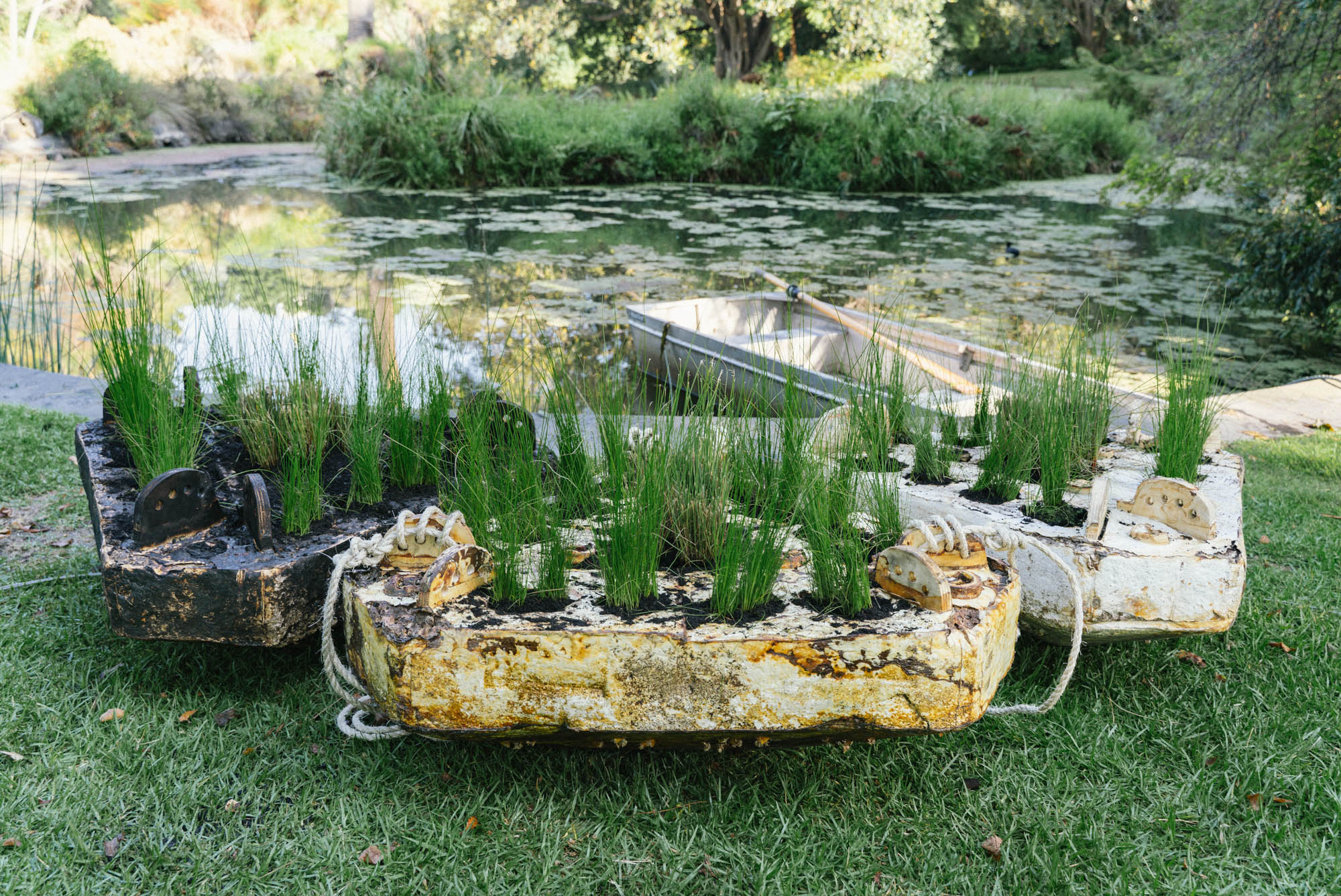Swinburne researchers contribute to world-first approach to cleaning waterways

Three mushi modules ready to be floated in a waterway at Melbourne’s Royal Botanic Gardens. Source: ARUP
In summary
- The solution involves three floating wetlands known as ‘mushi’
- The interlocking modules are created using mycelium and organic matter, which becomes a habitat for wildlife and allows plants to absorb pollutants in the water
- Mushi will be on display at the Royal Botanic Gardens in Melbourne until June 2021
Swinburne University of Technology researchers have contributed to a world-first organic solution to creating clean and healthy waterways. The solution is being trialled at the Royal Botanic Gardens in Melbourne and is the result of a research and design collaboration by Swinburne, studio edwards and Arup.
Cleaning our waterways: a living solution
The team’s solution involves three floating wetlands, known as ‘mushi’, which are a series of interlocking triangular-shaped modules about 80 centimetres in diameter.

Three mushi modules ready to be floated in a waterway at Melbourne’s Royal Botanic Gardens. Source: Arup
Rather than following the traditional approach using plastic, mushi wetlands use mycelium, the fast-growing feeding body of fungi, combined with other organic matter. The mycelium, from reishi or lingshi fungi, provides a robust, versatile and sustainable material that is set within specially designed moulds and expands as it dries to form the structure of the floating wetlands.
The Swinburne researchers – architectural design lecturer Canhui Chen and architectural engineering lecturer Daniel Prohasky – along with research assistant Joshua Salisbury-Carter contributed to the artificial wetland's structural design and fabrication. They investigated the relationship between the geometric design and the buoyancy of the wetland, as well as the material durability of the mycelium composite for outdoor use.
"The final product was prototyped and manufactured at Swinburne’s ProtoLAB, with the support of Swinburne architecture graduates," says Canhui Chen.
From concept to reality

Swinburne researchers, Daniel Prohasky (left) and Joshua Salisbury-Carter (middle) floating mushi modules. Source: Arup
The team has taken the mycelium wetlands from a theoretical concept that was shortlisted at the Victorian Design Waste Challenge 2019 to a living prototype, testing structural options and plant types. They will be monitoring and assessing it over the next three months.
“We were looking for ways to replace plastic in waterways: floating wetlands are a proven technology to help clean water but the traditional way of producing them, using plastic, creates other contamination issues when it inevitably degrades,” says Alex Reilly, Environmental Engineer at Arup Melbourne.
“The objective was to find an alternative to plastics using organic matter and waste to produce a product that would become a habitat for wildlife and allow the plants to absorb pollutants in the water. Mycelium can be strong, light, resilient, non-toxic and moulded into different shapes.”

Architectural design lecturer Canhui Chen (middle) creating a mushi module. Source: Arup
See for yourself
Mushi will be on display at the Royal Botanic Gardens in Melbourne, between Picnic Point and Long Island, until June 2021.
An online presentation of the mushi project is also available through Open House Melbourne.

Three mushi modules floating at the Melbourne’s Royal Botanic Gardens. Source: Arup
-
Media Enquiries
Related articles
-

- Technology
- Science
- Engineering
Victorian students drive green energy transition through international hydrogen competition
Swinburne’s KIOSC, in collaboration with Horizon Educational and Gippsland Tech School, co-hosted the Hydrogen Grand Prix in Melbourne.Friday 26 July 2024 -

- Design
Swinburne alum launches zine celebrating Asian Australian art and identity
Swinburne Graphic Design alum Dan Truong founded HOISZN, a zine publication showcasing Asian Australian artists and their work.
Monday 01 July 2024 -

- Science
Skin, scales and fish tails: using collagen to turn fish guts into gold
New research from Swinburne could transform the sector by converting high value collagen proteins from seafood by-products into cosmetics, food, and pharmaceuticals.
Tuesday 02 July 2024 -

- Education
- Engineering
Transforming the lives of refugee engineers through the EPIC Program
Swinburne has been partnering with the Level Crossing Removal Project (LXRP) on the Engineering Pathway Industry Cadetship (EPIC) program, helping refugee engineers gain international qualifications for the Australian workforce through an 18-month paid cadetship program.
Thursday 20 June 2024 -

- Design
Swinburne students shine in lighting design collaboration
Swinburne students collaborated with About Space Lighting, resulting in several student-designed lamps being put into production.
Friday 07 June 2024

